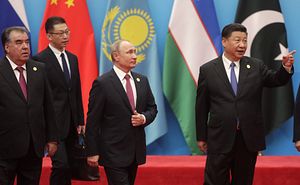Ukrainian Foreign Minister Dmytro Kuleba held a press conference with journalists from Central Asia on September 7, an effort to reach out to countries that share Soviet history with Ukraine but have remained ostensibly neutral amid the Russian invasion of the country, now approaching its seventh month. Of course, there are nuances to each country’s response to the Russian invasion, which began on February 24, and the ongoing war, but none have outspokenly criticized Moscow’s actions to the extent that Europe and the United States have.
It’s not clear exactly how many outlets participated in the press conference, but a survey of articles about the conference from two Uzbek and two Kazakh media outlets sheds some light on how these countries in particular are processing and discussing the war in Ukraine.
The two Uzbek outlets, Kun.uz and Gazeta.uz, honed in on Kuleba’s warning and plea to Central Asia — “Don’t let Russia use you” — highlighting the quote in the title of their articles reviewing the conversation. The Kazakh outlets — Vlast.kz and Exclusive.kz — naturally focused on comments Kuleba made directly referencing Kazakhstan, in particular his praise for Kazakh President Kassym-Jomart Tokayev’s diplomatic tightrope walk and warnings of the Russian threat to Kazakhstan.
Kuleba said that the Russia invasion of Ukraine was a crime and stressed that Kyiv had no aggressive intentions, pushing back against a Russian narrative that characterizes Ukraine as the aggressor. This was noted in both Uzbek outlets’ reviews, which quoted Kuleba as saying: “We never planned to attack anyone, no matter what they said on Russian television. Why would we attack someone?”
Kuleba then urged Central Asia to be wary of Russian information sources, something all four outlets noted. In response to a question from Exclusive.kz, Kuleba said, “[The Russians] are much better at propaganda than they are at war” after stating that Moscow is not, at present, capable of waging a second all-out war on Kazakhstan. He did warn, however, of hybrid war: “As for the hybrid war, everything starts with an internal buildup.”
While the Uzbek outlets did include Kuleba’s comments regarding Kazakhstan, the Kazakh outlets naturally spent more time on them specifically, with the Uzbek outlets highlighting the larger arc of Kuleba’s regional comments. Those comments stressed a degree of understanding of Central Asian reluctance to push back against Russia: “Why does President [Vladimir] Putin remain shaking hands in Central Asia? Because, obviously, your leaders, your governments understand that Russia is a threat, not a friend, and that you need to be as careful as possible with it.”
Kuleba said he had no right to tell Central Asian countries how to manage their relations with other countries, but he did stress that it was necessary to cast aside the “fear of Russia” to protect the national interest. He said that Russia would try to destroy the states of Central Asia at the first opportunity. “Your nations with thousand-year-old cultures, where centers of science and philosophy flourished when Moscow was still an impenetrable forest — none of this matters to them.”
“So don’t let Russia weaken you and don’t let Russia use you.”
Kuleba also emphasized that Central Asian states should not let Russia use the region to circumvent sanctions. He warned that whatever the perceived benefits of helping Russia circumvent sanctions may be, the costs would be higher. So far, only one Uzbek company has been identified as violating existing sanctions on Russia, but it’s possible (and perhaps likely) that there are more that could run afoul of the sanctions.
The Kazakh outlets additionally highlighted comments by Kuleba that only Tokayev has spoken directly with Ukrainian President Volodymyr Zelenskyy since the war began. Kuleba also praised Tokayev for expressing a position Putin did not like — a reference to Tokayev’s rejection of the possibility of recognizing Luhansk and Donetsk while seated beside the Russian president at the St. Petersburg International Economic Forum earlier this year. This kind of action, Kuleba said, “is a manifestation of sovereignty.” Kuleba took note of Tokayev’s balanced approach, maintaining relations with Russia while defending Kazakhstan’s sovereignty.
When it came to the question of inviting Russian (and Chinese) officials to meetings of Central Asian leaders, Kuleba said: “Putin has no place in any international forum, but this is the right of sovereign states [to invite him]. Keep in mind that when he visits your countries, he imagines that all this is the territory of Russia.”
Russian President Vladimir Putin and his Chinese counterpart, Xi Jinping, are expected to meet on the sidelines of the upcoming Shanghai Cooperation Organization summit next week in Samarkand, Uzbekistan.

































